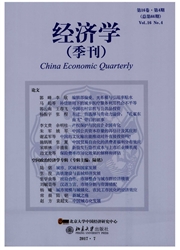

 中文摘要:
中文摘要:
本文构造了一个描述中国地方政府和中央政府之间的层级政治激励的模型,并在这个模型里讨论了地方政府改善物质基础设施的激励机制。我们首先在一个新古典的增长模型中引入了政府官员的绝对绩效考核,发现在相对完美的激励实施机制下地方政府官员面临的激励是基础设施投资的一个驱动力。然后,我们对绝对绩效评估方式进行了一些扩展,这些扩展包括相对绩效评估手段的实施考察、政府所面临的后验奖惩机制和预期、地方政府在晋升激励下的风险态度和晋升概率以及对于同质性风险和异质性风险的区分等。依赖这些扩展,本文进一步把政府行为与基础设施水平之间的关系模型化了。
 英文摘要:
英文摘要:
This paper models the hierarchical political incentive mechanism between local and central governments in China in order to explain the performances of local governments in improving the physical infrastructures. First, we develop a neo-classical dynamic growth model by introducing the mechanism of absolute performance appraisal, and the results indicate that the incentive mechanism is a driving force to expanding investment on local infra-structures. After that, we make some extensions to the hypothesis of absolute performance appraisal. These extensions include review of relative performance appraisal; ex post promotion and punishment, and ex ante expectation; risk preferences and the probability of promotion under the promotion incentive mechanism; division of homogeneous risk and heterogeneous risk, etc. Depending on these extensions, we refresh our conclusions about the relation-ship between government actions and infrastructures investments.
 同期刊论文项目
同期刊论文项目
 同项目期刊论文
同项目期刊论文
 期刊信息
期刊信息
